- Homepage
- Yellows
Beta-carotene deficiency
A frank beta-carotene deficiency should be rare; if present it leads ultimately to death. It's that important. Three million children become blind every year from extremely low levels of vitamin A.
Beta carotene is pro-vitamin A; it is the precursor of retinol.
A moderate shortage is very common, affecting many tissues of the body because of a dearth of fresh yellow, orange and green foods; and the refining of grains.
The solution is not supplements but simply more yellow maize, butternut and carrots; and other coloured-vegetables.
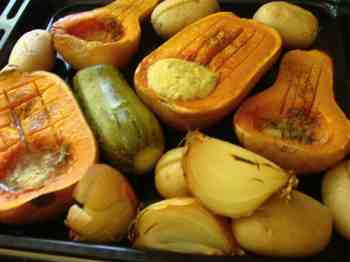
A pimply skin
A deficiency of this phytonutrient causes a pimply-skin, poor vision and weak bones; and reduced resistance to infections. It also makes one susceptible to a host of serious metastatic diseases, especially of the blood stem cells. This is not small beer.
In any case vegetables like butternut will be among your favourites when you learn how to prepare them; often a herb or spice will bring out the flavour.
This page was last updated by Dr Bernard Preston on 9th April, 2025.
Not as a supplement
This deficiency comes increasingly in a world that has been hoodwinked into believing that wellbeing comes in capsules rather from our food. If I do not get enough vitamin E or beta-carotene then I can just take a pill. Is that not right?
No it is not right. Increasingly researchers are saying that nutrients are less well absorbed, may be deposited in the wrong places and have other side effects when taken in capsules; beta-carotene supplements are associated with higher rates of malignant tumours, for example.
Lifestyle inadequacies are additive
Lack of attention to vitality is additive. For example if you have a marginal deficiency and you are stuck all day in front of a computer then women in particular are almost certain to suffer from disabling-fractures of their bones when they get older.
In fact hip fractures are now occurring in women less than fifty-years of age because of the refined food they eat and their sedentary existence; this does not just happen to other people. Soured milk as in kefir incidentally is one of the best sources of calcium; learn how to make it. It's so simple.
Cooking some vegetables like carrots actually increases the bioavailability of beta-carotene.
The science behind colour
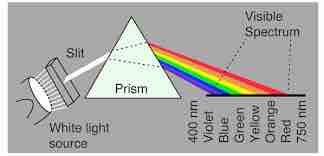
Let us talk first just for a moment about colour. An object would appear white because it absorbes none of the spectrum of light; all wavelengths are reflected to our eyes. But it would look orange or yellow if the greens and blues were taken up by the pigments in the material.
Beta-carotene has a structure with alternating double bonds, if you want to know about the chemistry. That is why blues and greens are absorbed but not the yellow which is then reflected to our eyes; so we perceive it as having an orangery appearance.
So a beta-carotene deficiency means you would not perceive colours well either. In its severe form it is the chief cause of blindness and death in a great many children every year; half a million in Sub-Saharan Africa.
Did you get that? Every year half a million children in just half of Africa go blind. A beta-carotene deficiency is the prime reason.
Beta-carotene deficiency
A full blown beta-carotene deficiency is rare in the developed world as this important precursor to vitamin A is found in many vegetables and fruits.
Nevertheless many people have a moderate yet serious shortage from their food; taking it as a supplement is both unnecessary and potentially dangerous.
You have to be a real meat and potatoes man to become frankly-deficient and actually die from too little vitamin A; which can and does happen to millions of people every year. First they go blind.
UNICEF estimates that nearly a million children alone under the age of 4 succumb annually; and many more adults of course. The published figures vary somewhat but all agree it is a massive number of kids.
What is beta-carotene?
Beta-carotene is a molecule found in vegetables such as butternut, pumpkins and carrots; yellow corn and the yolk of an egg too. It gives them their orange colour. It's an extremely important phytonutrient, without which we cannot be well. The RDA is around 10,000 International Units per day.
Probably the most important function of beta-carotene is that by splitting into two in the liver it is changed into a compound called retinol; which is vitamin A.
Let us also not underestimate its anti-oxidant properties that mop up damaging free radicals, thus preventing the formation of tumours especially in the bone marrow; the second greatest cause of death.
Blindness
Insufficient foods rich in beta-carotene means you and your children will be deficient in vitamin A; now it becomes serious.
The eye is a most wonderful organ and highly complex; vitamin A is changed to another form called retinal (the aldehyde for the chemistry boffins) which then combines with a group of proteins in the macula called opsins; when light strikes them, like a photovoltaic panel they turn the energy into electrical impulses.
"Vitamin A is an essential component of rhodopsin, the light sensitive protein in the retina of the eye."
- National Institutes of Health
Those impulses pass along the optic nerve and ultimately enable us to see an object when they reach the visual cortex. We are fearfully and wonderfully made but a beta-carotene deficiency will ruin it all. However it is not as simple as it would seem.
"Beta carotene supplementation has been found to be associated with an increased risk of tumours in smokers. And studies have shown a small but significant raised all-cause mortality in those taking high doses of vitamin E capsules.[4]"
- Dr Alice H. Lichtrenstein, DSc.
So vitamin A is a very important phytochemical that enables us to see properly and not go prematurely blind; alongside lutein and zeaxanthin, also carotenes. A deficiency of any one of these substances will also cause age-related macular degeneration, glaucoma and cataracts.
The simple solution
One cannot go worrying about whether we have eaten enough of this and that phytochemical. There are thousands; keeping track would be impossible and drive us crazy. There is a simple solution; enjoy at least seven to ten coloured-foods every day. Then you can be sure you'll be getting enough of most or all of them.
We aim for fifteen; avoiding vision-related diseases and malignant tumours is our passion.
You cannot easily overdose with beta-carotene from your meals, but you certainly can if you are taking supplements; let your food be your medicine.
The exception is large amounts of liver, particularly from animals that eat a lot of fish; then you can overdose. From plant sources it is less well absorbed, and getting too much is impossible; more likely a beta carotene deficiency if you are not eating enough yellow and orange foods.
Enjoying meals with a little fat improves the absorption so have plenty of butter with your hot vegetables; or avocado and olive-oil with salads. That also lowers the glycemic index, not unimportant in those who are prediabetic.
From our food there is a decreased risk of lung tumours, but numerous studies have shown that high doses of supplements, particularly in smokers, actually increases the likelihood of malignant neoplasms[1].
Bone strength
A beta-carotene deficiency has a profound effect on bone strength; the phytochemical stimulates the osteoblasts, the cells that lay down new tissue.
However an overdose also stimulates the osteoclasts that break down bone. This can never happen from plants sources of the vitamin but will from supplements; and eating very large amounts of fish liver.
Adequate potassium from our meals is vital too for strong bones; with less than two percent of those eating typical grocery store food getting the required 4,000 mg per day, is it any wonder that diseases related to blood pressure and osteoporosis are so prevalent?
One average avocado provides nearly 1,000 grams of potassium.
Diabetes
There is strong research confirming that the traditional use of pumpkin for diabetes is no old wives' tale; in small amounts to keep the load down. The seeds too lower blood-glucose by a massive 65%.
Pumpkin-pie with loads of sugar does not qualify, of course. The cinnamon is beneficial though. Could you enjoy a small helping with far less sweetening?
Cooking our own food means we have control over how much sugar and salt goes in; and chemicals like flavour-enhancers and stabilisers that are added to virtually all commercial meals.
Cognitive function
Researchers reporting in the Physicians Wellness Study II found that those with long term greater consumption of beta-carotene performed significantly better when it came to cognitive function; it delayed the onset of dementia by over a year[5].
Significantly they terminated the beta-carotene arm (from supplements) of the research because of the increased risk of neoplasms.
"Flavonoids are bioactives found in foods known to possess antioxidant properties; and reduce inflammation in the body."
- American Academy of Neurology
Researchers investigated the association between dietary intakes of flavonols and mental performance; global cognition, memory and visuospatial ability.
They found that plenty of flavonols from our food is associated with a slower decline of these abilities with older age[10].
Roasted butternut squash
This roasted butternut squash recipe is definitely my favourite source of beta-carotene. One cup will provide you with sufficient for all your needs each day.
Growing butternut squash is an easy vegetable to plant but you do need a large garden; protected by a thick skin the gourds keep for long periods of time so by all means get them from the greengrocer.
Just one serving, especially if it also contains some sweet potatoes as in a soup will supply our daily requirement and prevent any beta-carotene deficiency. The RDA is a little under 1000 mcg RAE units per day.
Its favourite spot is in the compost-heap; then you can be sure the nutrients will be far superior to anything from a commercial farmer but one can't grow everything. These organic butternuts are a wonder; unlike giant pumpkins they are so sweet.
What's the difference between our homemade recipe and a supermarket butternut squash soup? It is chalk and cheese; I make no apology for the time spent in preparing food from scratch. It tastes and is far superior, preventing an awful lot more than just a beta-carotene deficiency.
Freezing butternut squash is a very simple and quick way to preserve them for year-round enjoyment.
Either we spend a few extra minutes on choice-foods, superior in taste in every way, or we'll have to find many more hours to consult doctors about our cataracts, high blood pressure and diabetes; and many other even more serious diseases.
This stuffed butternut squash will ensure that you are getting plenty of beta-carotene; it can be prepared in an hour or so.
This butternut honey mead recipe is another way of preserving the phytonutrients for enjoyment all year round; using alcohol. But this is only for beekeepers and nutcases like Bernard Preston!
The material expressed on this page is gleaned from the nutritional and environmental literature; it is clearly referenced. A plain distinction is made between the author's opinion and that which is scientifically proven. When in doubt consult your health professional.
To suggest a correction or clarification, write to Dr Bernard Preston here. Contact.
Newsletter
Our newsletter is entitled "create a cyan zone" at your home, preserving both yourself and Mother Earth for future generations; and the family too, of course. We promise not to spam you with daily emails promoting various products. You may get an occasional nudge to buy one of my books.
Here are the back issues.
- Lifestyle and ideal body weight
- What are ultra-processed foods?
- Investing in long-term health
- Diseases from plastic exposure
- Intensive lifestyle management for obesity has limited value
- A world largely devoid of Parkinson's Disease
- The impact of friendly bacteria in the tum on the prevention of cancer
- There's a hole in the bucket
- Everyone is talking about weight loss drugs
- Pull the sweet tooth
- If you suffer from heartburn plant a susu
- Refined maize meal and stunting
- Should agriculture and industry get priority for water and electricity?
- Nature is calling
- Mill your own flour
- Bake your own sourdough bread
- Microplastics from our water
- Alternative types of water storage
- Wear your clothes out
- Comfort foods
- Create a bee-friendly environment
- Go to bed slightly hungry
- Keep bees
- Blue zone folk are religious
- Reduce plastic waste
- Family is important
- What can go in compost?
- Grow broad beans for longevity
- Harvest and store sunshine
- Blue zone exercise
- Harvest and store your rainwater
- Create a cyan zone at your home
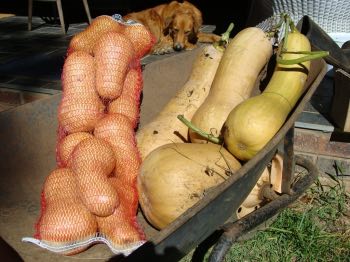
Our favourite way of preparing most foods that would prevent a beta-carotene deficiency is by pressure cooking; roasting is great too but has a higher glycemic index.
Making a perfect butternut smoothie for breakfast takes only a few minutes if you have some of the soup on hand.
Growing zucchini is another of our favourites, particularly because they are also one of the few sources of two other very important phytochemicals for the eyes; both lutein and zeaxanthin.
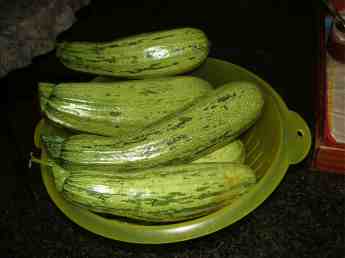
These are the plants from our garden that are known as phytochemical foods. They supply the vast range of needed substances that you simply cannot measure; there are over 600 carotenes alone for example. Trying to keep a measure of them all will simply lead to what I call a food nut neurosis. To be honest, it is a serious psychological condition that I myself have had to face; do not go totally overboard.
Yet a sound and blameless body is what we all should strive for; poor decisions can and do ruin many lives. One of them is meal planning that leads to a beta-carotene deficiency.
Just get your face, hands and feet thoroughly underwater, only not your brain! These buttered gem squash are another favourite; notice the breadth of food that we are advocating, all unrefined and rich in colour.
The chaote squash is another good source of beta-carotenes.
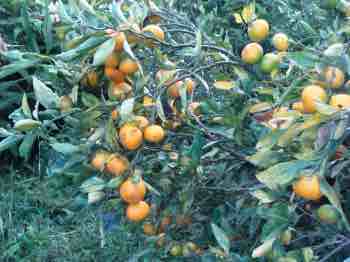
Your citrus fruit list is another excellent source of vitamins and phytochemicals that will prevent any suggestion of a beta-carotene deficiency. Whether it's lime marmalade or a mandarin orange tree, they all contribute.
Planting sweet potatoes is definitely only for the larger garden, but they actually top the list in the prevention of beta-carotene deficiency stakes. They don't keep as well as butternut and should be kept in the refrigerator and eaten fairly quickly.
Grilled yellow mealies are another great way to get plenty of beta-carotene; and zeaxanthin which is so important in the prevention of macular degeneration.
This green mealie risotto is a great favourite in our family.
Carrots
Carrots of course are another excellent way to prevent a beta-carotene deficiency; but raw or cooked?
Livny et al researched the question, comparing the bioavailability of beta-carotene from cooked versus raw carrots. Both in fact were a good source but 50% more was absorbed from the boiled and pureed meal[2].
A carrot smoothie is a great way to start any breakfast.
Peppers
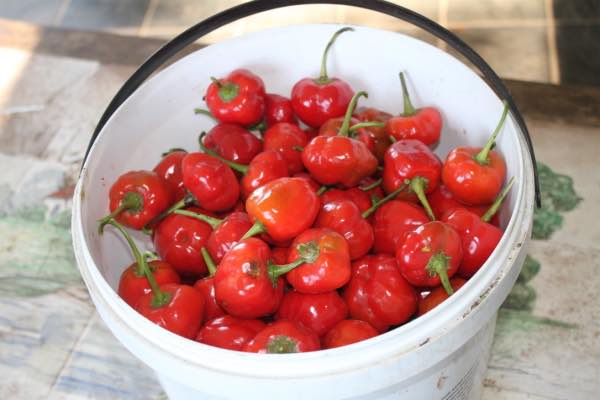
The pepper family especially those sweet red paprikas are the richest source of beta-carotene. They are very easy to grow in a mild climate though staking them can be a challenge; when in fruit, the branches are very heavy.
We just love the sweet "punt paprika" that we got from Holland; and peppadews for a little spice. Both are so easy to grow in your own garden. Make sure your family doesn't suffer from a beta-carotene deficiency.
Growing peppadews is a breeze. They are my favourite from the chili family; oodles of flavour and not too hot.
The easiest way to preserve the chili family for the rest of the year is to freeze the fruit; but we also pickle and ferment them. Drying the pods and grinding them into a peppery powder takes more time; it adds a little spice to any egg recipe.
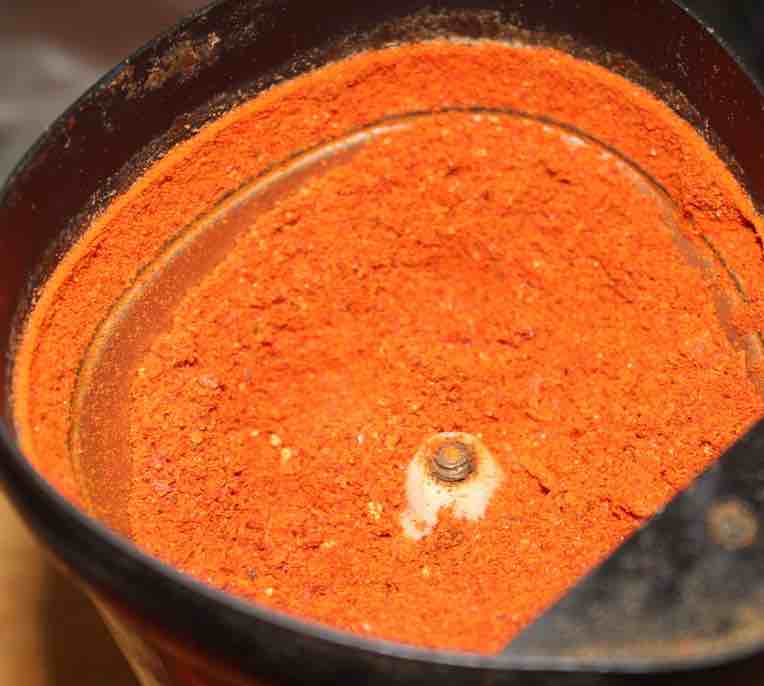
Supplements with the exception of folate generally showed no benefit for cardiovascular outcomes or death from any cause[3]. We are unashamed disciples of Hippocrates; let your food be your medicine.
Grains
Maize has a higher carotenoid content compared to other grains, particularly yellow corn; zeaxanthin is the dominant nutrient. Domestic boiling into a porridge and steaming of the whole cob yielded the largest amounts[9].
However the traditional methods of toasting to make cornflakes results in 80% loss; a beta-carotene deficiency is far more likely.
In maize unlike other grains, most of the carotenoids are found in the endosperm (95%); refining should not have a great effect. But for some explained reason it would seem that it does.
- Stone ground grits yields the largest amounts of beta-carotene.
- What is yellow maize good for?
"American nutritional scientist Elmer McCollum discovered that an "accessory" substance present in some fats (and as beta-carotene in many fruits and vegetables) was essential to rat growth; it became known as vitamin A."
- National Geographic
Longevity
Researchers reporting in the Journal of the American Geriatric Society found that there is a strong correlation between serum carotenoids, physical activity and all-cause mortality in older women[6]. Those in the highest percentile were a massive eight times more likely to still be alive at the end of the five year study as compared to folk in the lowest group.
There are many reasons why carotenoids give protection. One of them is a greatly reduced incidence of CHIP, or clonal hematopoiesis. The number of abnormal blood stem-cells is greatly increased in those eating food low in fruit and veg, and high in red meat.
These cells increase the likelihood of blood neoplasms[7]; leukaemia and lymphoma.
- ß-Carotene and Lung Cancer in Smokers
- Beta-carotene bioavailability from differently processed carrot meals in human ileostomy volunteers
- Supplemental Vitamins and Minerals for CVD Prevention and Treatment
- Supplements and Older Adults
- A randomized trial of beta carotene supplementation and cognitive function in men. https://pubmed.ncbi.nlm.nih.gov/17998490/
- Fruit and vegetable intake, physical activity and mortality in older community-dwelling women. https://pubmed.ncbi.nlm.nih.gov/22587851/
- Association of Diet Quality With Prevalence of Clonal Hematopoiesis. https://jamanetwork.com/journals/jamacardiology/fullarticle/2780386?guestAccessKey=1ddb7bc7-d701-4e8b-acfd-87d4994395f3&utm_content=weekly_highlights&utm_term=061321&utm_source=silverchair&utm_campaign=jama_network&cmp=1&utm_medium=email
- What is antioxidant good for?
- Carotenoids in Cereal Food Crops: Composition and Retention throughout Grain Storage and Food Processing
- Association of Dietary Intake of Flavonols With Changes in Global Cognition and Several Cognitive Abilities
When browsing use right click and "Open Link in New Tab" or you may get a bad gateway signal.
Did you find this page interesting? How about forwarding it to a friendly book or food junkie? Better still, a social media tick would help.
- Homepage
- Yellows
Address:
56 Groenekloof Rd,
Hilton, KZN
South Africa
Website:
https://www.bernard-preston.com